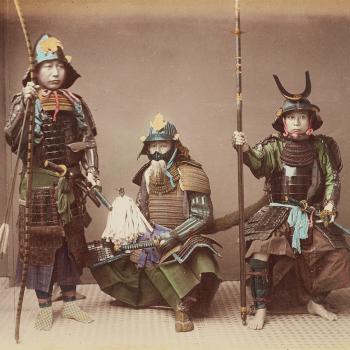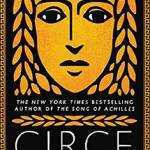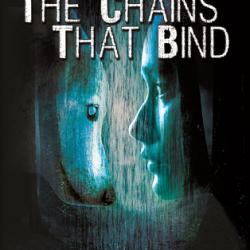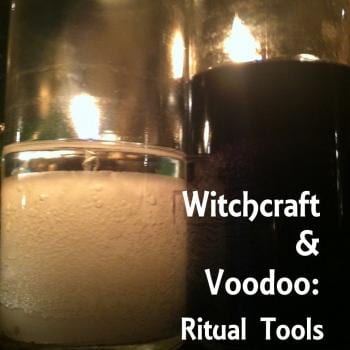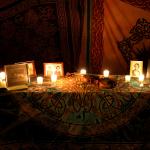Welcome to “From the Shadows,” which, in a nutshell, is my new column for rants here at the Between the Shadows blog! To give you an idea of what I intend to do with it, hopefully in a couple of months you’ll see that tagline and think, “What’s she on about now?” Enjoy!
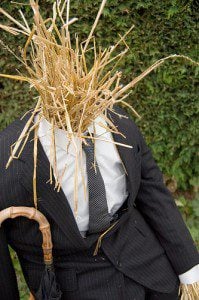
I’m getting a little weary of straw man arguments. They proliferate through the Pagan community and in particular the blogosphere. We need to set torches to them and have a fantastic Samhain burning.
A straw man is a common form of argument and is an informal fallacy based on false representation of an opponent’s argument. To be successful, a straw man argument requires that the audience be ignorant or uninformed of the original argument.
The so-called typical “attacking a straw man” argument creates the illusion of having completely refuted or defeated an opponent’s proposition by covertly replacing it with a different proposition (i.e., “stand up a straw man”) and then to refute or defeat that false argument (“knock down a straw man”) instead of the original proposition.
This technique has been used throughout history in polemical debate, particularly in arguments about highly charged emotional issues where a fiery, entertaining “battle” and the defeat of an “enemy” may be more valued than critical thinking or understanding both sides of the issue.
I see this all the time in our community. The party for whom the debater has set up the straw man finds themselves in a defensive position, feeling they must explain that the point that the debater is arguing against simply isn’t true. It’s a point of frustration for the victim and all it does is to spread misinformation.
This nonsense sounds exactly like the stories you used to hear in Christian bookstores, about how some fundamentalist was able to sway the opinions of the multitude of “sinners” through the power of God and their winning arguments. They never named the sinners. They never gave dates or the specific circumstances of this wondrous event. When pressed for details, they muttered something about confidentiality and disappeared.
I’ve been politely holding my tongue because of the Curse of Pagan Niceness, but I think it’s time I got the torches and set fire to some ridiculous scarecrows. Actually, why not go for broke? Let’s fire some burning arrows. Let’s get some flamethrowers!
The Hidebound Elders
Proponents of some paths that are gaining momentum in the Pagan community at this time legitimize their path by claiming that they are doing new, exciting and original things, unlike the “hidebound elders” of Paganism. They say that the new generations “are upsetting and delighting the older generations with their newly evolved beliefs and practices.”
So here’s my question: where are they? The hidebound elders, I mean? Please name some. Because all the elders I know are pretty radical. Do you mean Oberon Zell? You can’t possibly, because Oberon Zell is so radical that people still have trouble keeping up with him. Do you mean Janet Farrar? She invented shamanic witchcraft with her tradition of Progressive Witchcraft. So just who are these Hidebound Elders anyway?
This Straw Man is a coward’s way out. If the Hidebound Elders actually exist, by not naming them you refuse to allow them an opportunity to debate your opinion or defend themselves. It’s kind of like spreading rumous and then invoking “confidentiality” when you are asked where it was that you heard said rumour. It’s not fair to the person that the rumour is about. It suggests that you believe the nasty tale; because if you didn’t, then you would be protecting a liar, wouldn’t you?
More likely, the Hidebound Elders don’t really exist, but by inventing this fictional enemy the disaffected are given something to rally against; just like the proponents of the Burning Times myth were doing in the 90s.

Old Fashioned Uncool Witchcraft
The proponents of this party line say that their practice is a totally new invention. Old-Fashioned Witchcraft and Wicca never did anything this cool, thanks to the stranglehold of the Hidebound Elders. This argument is usually presented when speaking of ecstatic trance practices, using drugs and entheogens, or practicing ordeal or sex magick.
I’m sorry I missed the 60s too. But our elders didn’t. If you seriously think you’ve invented anything new that wasn’t tried in the Summer of Love, you haven’t been paying attention. Our elders tried every intoxicant known to humanity and a few that weren’t, and they’ve been writing about the religious-mystical insight they’ve received from that since the Harvard Psilocybin Project in the early 60s. Sex in the 60s and 70s was freely available in every night club and part of the reason that witches developed a reputation for having orgies is because they did.
And I guess you never read Aleister Crowley? His wife had sex with a goat. A goat. Have you had sex with a goat? Do you still think that your Fifty Shades of Grey-inspired ordeal sex magick rite is the “cutting edge” of sexuality and faith? I guarantee that if you’ve thought of it and flushed red with embarrassment because it was just so weird and radical that you wouldn’t dare try it, Crowley did it. Probably twice. And he was probably high on cocaine, mescaline or opium – or all three – when he did it. And that was the 1920s, which was an unprecedented period of permissiveness and daring, when women started wearing men’s clothing, gay couples lived openly, and drugs were everywhere.
And ecstatic trance? That’s what Drawing Down the Moon and Sun is all about. And before that they called it channelling, and spiritual trance mediums did it. That’s been going on since the beginning of the twentieth century. Before that they called it “speaking in tongues”. Before that it was called “issuing prophecy.” Before that it was “shamanic trance.” You get the idea.
I think that some of us are still stuck in the 90s and arguing against all the “politics of respectability” books that were produced then. As so many elders of the time said, that’s not what real Craft or real Paganism looks like, and it never did look like that. A lot of the proponents of the “new original craft” theory started with Scott Cunningham so maybe that’s what they think Wicca and Paganism are; bowdlerized facsimiles of what people were actually doing in their practice. I guess some of you might not remember the 90s (including some current writers who are, you know, all of five years younger than I am) but people’s children were being taken away and I know of at least one case in which a man was convicted of murder because he was a witch and the police didn’t like him. It’s not like people weren’t doing this stuff; they just didn’t tell people about it or write about it much. As a guest contributor to Raise the Horns, Benny Bargas, pointed out in his recent article on the topic, “There is nothing to prevent one from being a participant in a traditional path and also experiencing ‘personal gnosis, mysticism, direct ecstatic experience, and spirit initiation.'”
I will, however, give kudos to those who dared to speak out again when the Satanic Panic had passed. Raven Kaldera is worthy of a nod of respect for speaking about BDSM, transgender issues and polyamory in Paganism and religious practice. Storm Faerywolf deserves recognition for writing about inclusive Great Rites. Sarah Anne Lawless is to be commended for defending the use of flying ointments and hexes. Juniper Jeni deserves acknowledgement for speaking out in defense of ecstatic practice and mysticism in the Craft. But none of them are original and they’re not doing anything that hasn’t been done before. Not that you’d know it.
We often deride IRAB Pagans (I Read a Book) because we say that Pagan practice is experiential. But if you haven’t read a book, you think you’re reinventing the wheel. Perhaps experiential practice and corroborated research should be balanced.
Gender Essentialism
“You keep using that word. I do not think it means what you think it means.” ~ Inigo Montoya in The Princess Bride
I am a staunch trans ally. If you read my writing you will see that I am a vocal proponent of gender equality and I oppose cis-gender based prejudice and try to check cis-gender privilege when I find it. But simply mentioning gender is not gender essentialism.
Gender essentialism has an actual defined meaning in academic discourse.
Definition: The term gender essentialism is one that may be unfamiliar to people who have neither taken a women’s studies course nor read a lot of feminist discourse on gender in society. However, gender essentialism actually refers to a very simple concept. It is the idea that men and women act differently and have different options in life because of intrinsic or essential differences between the genders.
Gender essentialism is often used to excuse gender-based biases in society such as how jobs traditionally held by women are often accorded less respect and lower pay… or how female athletes who are too successful may be required to undergo genetic testing to determine if they’re “really men”. Gender essentialism is both informed by gender stereotypes and reinforces them, and it can have numerous effects on society both inside and outside of the sexual realm. Gender essentialism may also contribute to homophobia by promoting assumptions about how relationships “should” work that are rooted in essentialist notions of gendered behavior. For example, asking a married lesbian couple, “Which one of you is the husband?” assumes that the traditional male role is necessary for a successful marriage and that one of them must therefore be performing it.
Acknowledging the existence of such a thing as gender is not “gender essentialism.” Nor is it a synonym for perceived misogyny. It’s become a buzzword that is more about attacking a person’s character than about debating gender issues. And that’s a different kind of logical fallacy: an ad hominum, which is about attempting to discredit an opponent so that you won’t have to engage with their point.
Furthermore, it’s unequally applied. Everyone agrees that British Traditional Witchcraft is gender essentialist. So why isn’t Dianic Witchcraft ever accused of being gender essentialist? Dianic witches (often) claim that women are holier than men simply on the basis of being women. That’s kind of the definition of gender essentialism, isn’t it?
By propping up the Straw Man of “gender essentialist Wicca” you can then dismiss anything a Wiccan says on the basis of they’re a bunch of prejudiced a$$holes anyway. Which is utter bunk and, like anything else, varies widely from person to person. There’s a$$holes in every bunch. And being an a$$hole does not make your point invalid.
Fluffy Bunnies
Again, who are the fluffy bunnies? What does that even mean? If you mean people who are new to the Craft, you’re not being fair. You were new once too. Otherwise, with the exception of some New Age types who cloak their pseudo-Christian spiritualism in Pagan terminology, it seems to me that fluffy bunnies don’t actually exist. People invoke this term to dismiss people who hold an ethical view they disagree with; such as choosing not to hex, choosing not to use drugs in ritual or practice sex magick, or holding to the Wiccan Rede. This is a classic Straw Man; people make up the fluffy bunnies to justify their fundamentalist viewpoint. After all, if they don’t defend us against the fluffy bunnies by being holier-than-thou hard-asses, where would Paganism and the Craft be?
The Fundamentalist Brit Trads
I’ve fallen victim to this one. This Straw Man claims that there’s a minority of initiated British Traditional witches who view themselves as an elite, guarding their One True and Right Way against the spread of fluffy bunnies and cool new traditional (?) ideas alike.
I’d like to know where they are. Because aside from a handful of jerks on the internet who might be completely full of dung about their histories and credentials, I don’t know any Brit Trad types like that at all. And I know quite a few Brit Trads now. Dodie Graham McKay is an initiated Alexandrian and Jason Mankey is an initiated Gardnerian; both of them are keenly interested in ecstatic witchcraft and both, like me, are on traditional witchcraft and shamanic witchcraft lists. Both are vocal defenders of originality and creativity in the Craft. I have a friend named Leaticia who is an initiated Gardnerian High Priestess only thrice removed from Gardner himself; she hostesses open multi-traditional Sabbats at her house. Thorn Mooney seems like a topical Gardnerian writer with interesting things to say. And then there’s Yvonne Aburrow; you know, the woman who just wrote a book on the Craft that has been lauded for its progressiveness and inclusiveness?
Again, name some names and then I can agree or disagree with you. Otherwise your argument is nothing but an empty suit of clothes on a stick.

The Irrational Theists Who Don’t Understand Science
Poppycock and hogwash. The Scientific Method involves setting up experiments that can be repeated to prove or disprove a theory. If it can’t be disproven then believing it is perfectly scientific. Denouncing it when it has not been disproven is in direct violation of the Scientific Method. Theists often have the evidence of their senses (whether they wanted to believe that evidence or not) to support their beliefs. And believing in the evidence of your senses is pretty scientific.
The God-Hating Atheopagans
Again, pure mythology. Some don’t believe in the gods as you understand them. Some don’t believe that the gods are as important as you do, but they still believe in them. Some believe that the nature of the gods differs from what you believe their nature to be. Brendan Myers wrote a great article about this particular Straw Man recently. Just because someone doesn’t believe that the gods are important in their practice, or just because someone’s experience of the gods differs from yours, doesn’t mean that they don’t think that the gods exist. Or that they hate them.
Man-Hating Feminists
I have to say, this Straw Man gets old. Just because I believe in equality for all genders does not mean that I automatically hate men. I like men quite a lot actually. Maybe too much. Women too. I have yet to have a transgendered partner but I imagine I’d like them too much as well. Misogynists have been using this argument for years. It’s a bunch of empty clothes. Let’s move on please.
My New Tradition is Actually Older Than Your Old Tradition, So it’s Better
Hutton rocked the world of witchcraft by debunking the “Old Religion” myth. What I find astounding is that we’re supposed to continue to believe all the (equally improbable) origin myths of other Pagan traditions, and we’re insulting their religion when we question those myths.
- Do you really think that Druidry has been practiced in a steady, unbroken line since the Celts? I suppose you’re going to try to convince me that the Celts practiced ceremonial magick then? You’d have to, since the oldest Druid orders look a lot like the Rosicrucians and Freemasonry.
- I also don’t believe any claim that relates to anyone being of bloodlines that descend from the Druids. You think you can prove me wrong? Sign up for 23 and Me and send me the results.
- You expect me to take your word that a blind child was wandering alone in the woods and happened to meet a gypsy woman who knew precisely when and where he would be, and subsequently taught him the “real” Old Religion, which just happens to blend Polynesian Huna, modern Wicca and circus gypsy bujo? Why isn’t it on record somewhere? Surely the child’s parents would have been arrested for abuse and neglect! Substantiate your sources, please.
- I have a friend who actually said that he lost interest in Wicca when he learned it was a new religion, who says that he is now practicing a ten thousand year old shamanic tradition. How does he know it’s ten thousand years old? Because that was revealed to the founders in dreams. I’m sure they must be doing some really great stuff because they’re really popular, but I think I should let him know about a bridge in Brooklyn I have for sale . . .
People were so desperate to try to find the “real witches” of oldentimes that they made up an entirely new form of witchcraft when Wicca’s “ancient origins” were debunked. But this tale is even less likely. A handful of spells and folk magick from superstitious Christians living in the woods does not a religion make.
And then, on top of claiming that your religion is older, you want to claim that you’re doing new and spiffy things that the Hidebound Elders have never done before. Not only are both of these arguments Straw Men, they are internally inconsistent and directly contradict each other. You can’t have it both ways!
Blame the “ancient orders” of Freemasonry, Oddfellows and the like for this scarecrow, which keeps popping up like a balloon punch dummy. Being older does not make something either better or more legitimate. Being newer does not necessarily make anything “more original.” And there is absolutely no such thing as an ancient tradition or unbroken line in modern Paganism.
Burn, Baby, Burn!
I value diversity in Paganism. I value truth and mystical insight revealed through gnosis, visions and dreams. I value contradictory truths and pioneers who beat untrodden paths through wilderness. But let’s ground these things in truth and honesty, not in an army of humanoid shapes made up of rags filled with dried grass.
Like us on Facebook at the Patheos Pagan Facebook page or the Between the Shadows Facebook page.







